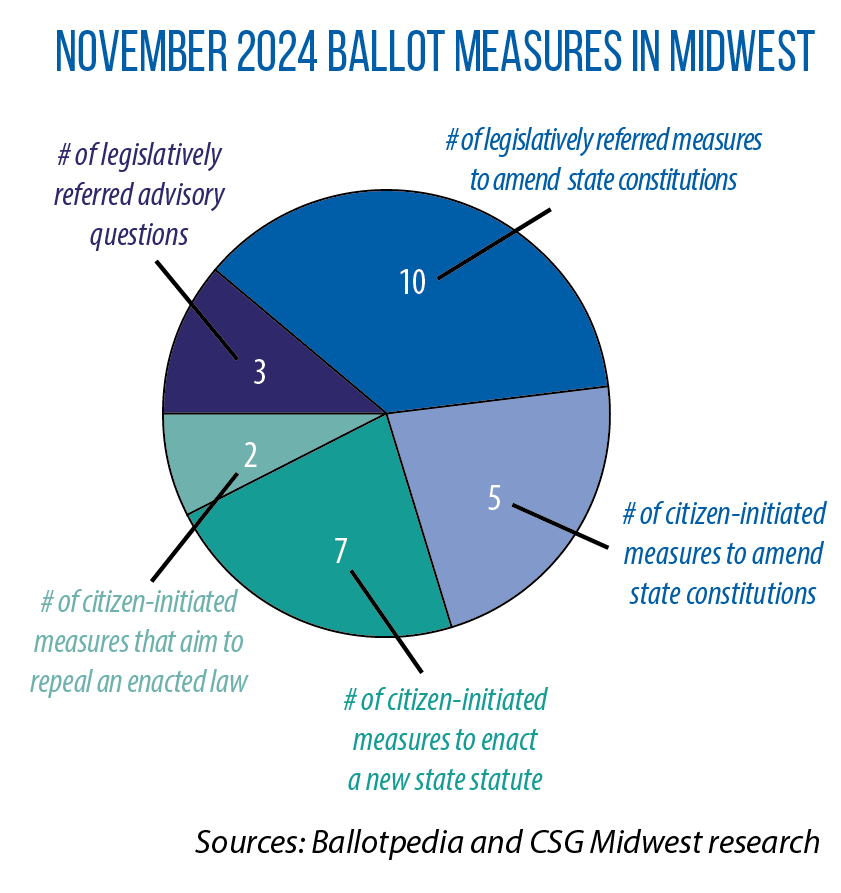Voters’ turn: 27 measures on ballot in eight Midwestern states
Here is look at proposals on abortion, taxes, redistricting, elections and marijuana — as well as a state-by-state overview of all 27
 Abortion policy to be decided in two more Midwestern states
Abortion policy to be decided in two more Midwestern states
Nebraska and South Dakota are among 10 U.S. states with ballot measures on abortion. According to the Kaiser Family Foundation, all but one of these proposed constitutional amendments seeks to protect abortion rights.
 The one exception is a measure in Nebraska that would enshrine in the state Constitution a law passed by the Legislature in 2023 (LB 574). It prohibits most abortions after the first trimester, with exceptions for medical emergencies or for pregnancies caused by sexual assault or incest. A competing proposal in Nebraska would establish a right to abortion until fetal viability.
The one exception is a measure in Nebraska that would enshrine in the state Constitution a law passed by the Legislature in 2023 (LB 574). It prohibits most abortions after the first trimester, with exceptions for medical emergencies or for pregnancies caused by sexual assault or incest. A competing proposal in Nebraska would establish a right to abortion until fetal viability.
In South Dakota, most abortions are banned under a law that took effect after the U.S. Supreme Court’s 2022 Dobbs decision. The only exception is if a medical provider determines the procedure is “necessary to preserve the life of a pregnant female.”
Under this year’s proposed constitutional amendment, a state-level ban would be allowed only for the third trimester of a pregnancy, and it would need to have exceptions to protect the health and life of a pregnant woman. During the first trimester of a pregnancy, South Dakota women would have a complete right to abortion. Any state-level regulation during the second trimester would need to be “reasonably related to the physical health of the woman.”
Abortion-related ballot measures already have been voted on in three Midwestern states since the Dobbs decision. Kansans rejected a legislatively referred constitutional amendment stating there was no right to an abortion in the state Constitution. Voters in Michigan and Ohio included the right to an abortion in their respective state constitutions.
 End of the property tax in North Dakota? Food sales tax in South Dakota?
End of the property tax in North Dakota? Food sales tax in South Dakota?
Property tax relief was a common theme this year in the Midwest’s legislatures, and the subject of special sessions held in Kansas and Nebraska.
In November, North Dakotans will decide whether to take a much further-reaching step — elimination of the property tax. A citizen-initiated constitutional amendment would “prohibit the state government and all local taxing entities from assessing a property tax on real or personal property.”
The Legislative Assembly would be constitutionally obligated to find a way of replacing this revenue for local governments, estimated to be a biennial total of $3.15 billion. According to the Lincoln Institute of Land Policy, the property tax accounted for 10.0 percent of total state and local revenue in North Dakota in 2021. For other Midwestern states, it accounts for an even greater percentage, ranging from 10.4 percent in Indiana to 20.4 percent in Illinois.
Voters in South Dakota, meanwhile, face a decision about the future of sales taxes on food. Most states in the Midwest do not levy such taxes, with the lone exceptions being South Dakota, Kansas (where the food tax is being phased out) and Illinois (food is taxed at a lower rate, 1 percent, and the tax will be eliminated in 2026).
South Dakota’s proposed citizen-initiated statute would ban the state from collecting sales and use taxes “on anything sold for human consumption, except alcoholic beverages and prepared food.” Legislative fiscal analysts have pegged the impact on state revenues at anywhere between $133.6 million and $646.43 million, depending on how “human consumption” is interpreted.
 Changes to redistricting process on ballot in Ohio again
Changes to redistricting process on ballot in Ohio again
Prior to the last round of decennial redistricting, voters in Ohio and Michigan approved ballot measures that changed the process for redrawing legislative and congressional lines.
In Ohio, the pair of legislatively referred constitutional amendments (from 2015 and 2018) included provisions that aimed to encourage bipartisanship and prevent gerrymandering. However, the General Assembly and a commission of elected officials retained control of the process.
In contrast, Michigan’s citizen-initiated constitutional amendment (from 2018) created an independent redistricting commission, whose members cannot be legislators or other elected officials.
In 2024, redistricting is once again on the ballot in Ohio. This time, though, it’s in the form of a citizen-initiated constitutional amendment calling for creation of a Michigan-style, nonpolitician commission. In the Midwest’s nine other states, redistricting remains in the hands of state legislatures and governors (unless an impasse or legal challenge leads to intervention by the courts).
Redistricting reform has been the subject of multiple U.S. state ballot measures in recent years.
However, over the last decade, it has only appeared on the ballot in one other Midwestern state, South Dakota. In 2016, voters there rejected a commission-style approach.
 Elections, voting are the subjects of ballot measures in Iowa, South Dakota and Wisconsin
Elections, voting are the subjects of ballot measures in Iowa, South Dakota and Wisconsin
The legislatively referred measures in Iowa and Wisconsin seek constitutional language prohibiting state and local governments from allowing noncitizens to vote.
The Iowa measure also would give 17-year-olds the constitutional right to participate in primary elections, if they will turn 18 by the general election. Legislators first expanded this right under a 2017 law.
South Dakota’s elections-related measure would abolish party primaries in races for U.S. Congress, state Legislature, the governor and county offices. Instead, in the election for each of these offices, candidates would compete in a single, open primary. The top vote-getters, regardless of party, then move on: the top two candidates for a race in which one person is to be elected in the general election, and the top four candidates when two are to be elected in the general election.
According to Ballotpedia, South Dakota is one of eight states (no others in the Midwest) with November ballot measures to establish nonpartisan primaries and/or ranked-choice voting.
Nebraska is the only Midwestern state with any kind of nonpartisan primary system for state-level races. It’s used there for elections to the nonpartisan Unicameral Legislature.
 Marijuana legalization continues to appear on ballots in Midwest
Marijuana legalization continues to appear on ballots in Midwest
Over the last six years, the adult use of recreational marijuana has been legalized in four Midwestern states: Illinois (2019) and Minnesota (2023) through legislative action, Ohio (2023) and Michigan (2018) through direct votes of the citizens. Legalization measures are on the ballot this November in North Dakota and South Dakota, in the form of citizen-initiated state statutes. These two states already allow for the medical use of marijuana as the result of previous voter-approved measures.
A medical cannabis program would be established in Nebraska under two proposals before voters: one to legalize medical cannabis, a second creating a state commission to oversee and regulate its use.
State-by-state overview of all 27 measures on November 2024 ballots in the Midwest
Illinois
 Three legislatively referred advisory questions on 1) raising the income tax on incomes greater than $1 million and using the additional dollars for property tax relief; 2) requiring health coverage for in vitro fertilization and other medically appropriate reproductive treatments; and 3) establishing civil penalties for candidates for office who interfere with election workers
Three legislatively referred advisory questions on 1) raising the income tax on incomes greater than $1 million and using the additional dollars for property tax relief; 2) requiring health coverage for in vitro fertilization and other medically appropriate reproductive treatments; and 3) establishing civil penalties for candidates for office who interfere with election workers
Indiana
 One legislatively referred constitutional amendment to remove the school superintendent from the line of gubernatorial succession
One legislatively referred constitutional amendment to remove the school superintendent from the line of gubernatorial succession
Iowa
 Two legislatively referred constitutional amendments on 1) prohibiting noncitizens from voting; and 2) clarifying the gubernatorial line of succession
Two legislatively referred constitutional amendments on 1) prohibiting noncitizens from voting; and 2) clarifying the gubernatorial line of succession
Minnesota
 One legislatively referred constitutional amendment to continue using lottery-derived revenue to fund environment and natural resources projects
One legislatively referred constitutional amendment to continue using lottery-derived revenue to fund environment and natural resources projects
Nebraska
 Two citizen-initiated constitutional amendments on abortion
Two citizen-initiated constitutional amendments on abortion- Three citizen-initiated state statutes to 1) legalize medical marijuana; 2) regulate medical marijuana; and 3) ensure workers can earn paid sick time
- One citizen-initiated measure to repeal a law providing tax credits for donations to private school scholarship programs
North Dakota
 Three legislatively referred constitutional amendments to 1) change language describing people with disabilities; 2) alter rules on citizen-initiated constitutional amendments; and 3) establish new rules on transfers from the Legacy Fund
Three legislatively referred constitutional amendments to 1) change language describing people with disabilities; 2) alter rules on citizen-initiated constitutional amendments; and 3) establish new rules on transfers from the Legacy Fund- Two citizen-initiated state constitutional amendments or statutes to 1) eliminate the property tax; and 2) legalize the recreational use of marijuana
Ohio
 One citizen-initiated constitutional amendment to create a nonpolitician redistricting commission
One citizen-initiated constitutional amendment to create a nonpolitician redistricting commission
South Dakota
- Two legislatively referred constitutional amendments to 1) use gender-neutral terms in references to officeholders; and 2) authorize a work requirement for certain Medicaid enrollees
 One citizen-initiated constitutional amendment to provide a right to an abortion
One citizen-initiated constitutional amendment to provide a right to an abortion- Three citizen-initiated state statutes or constitutional amendments to 1) establish nonpartisan primaries; 2) end the food sales tax; and 3) legalize the recreational use of marijuana
- One citizen-initiated measure to repeal a law on carbon pipelines
Wisconsin
 One legislatively referred constitutional amendment to prohibit voting by noncitizens
One legislatively referred constitutional amendment to prohibit voting by noncitizens